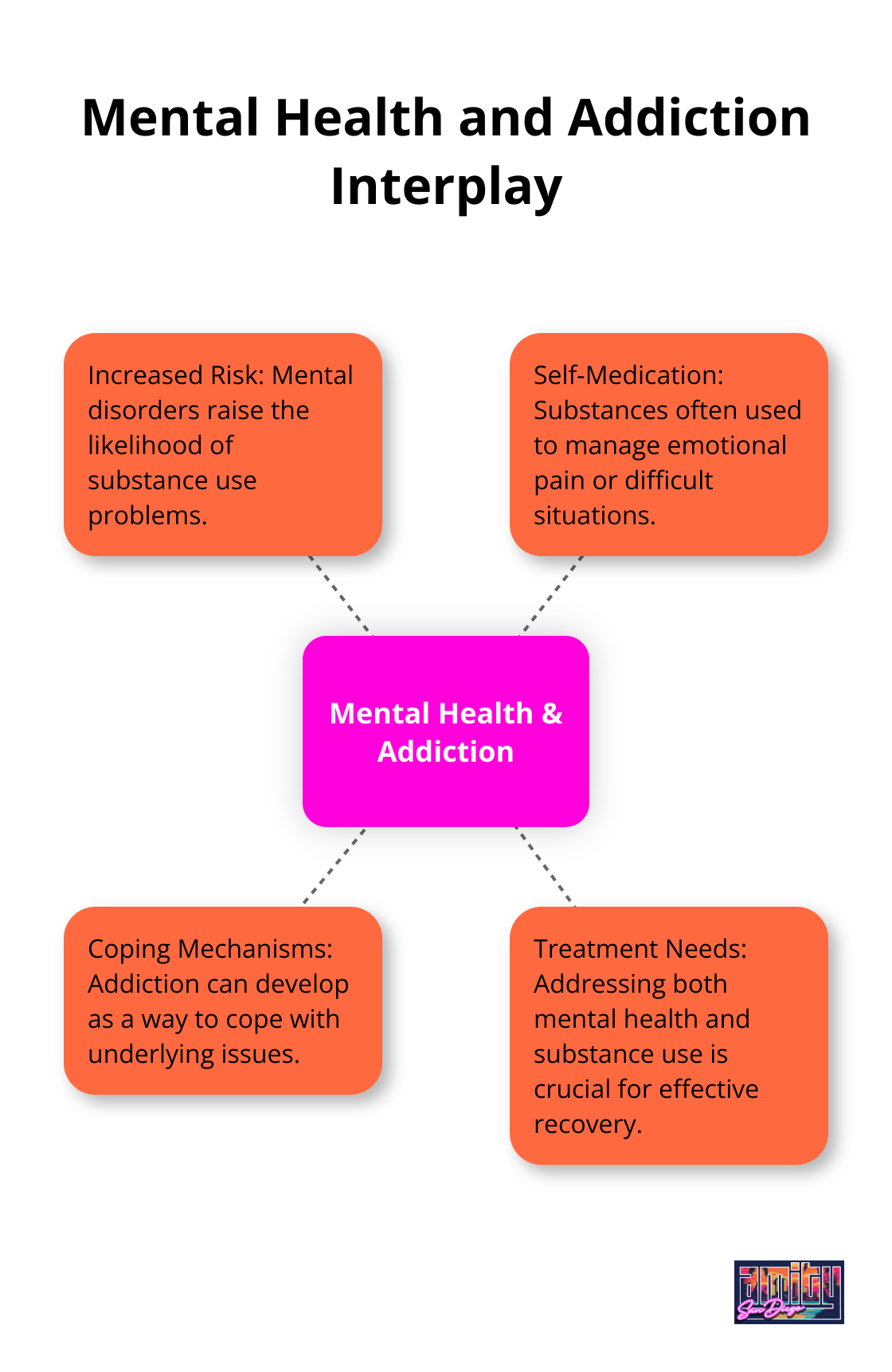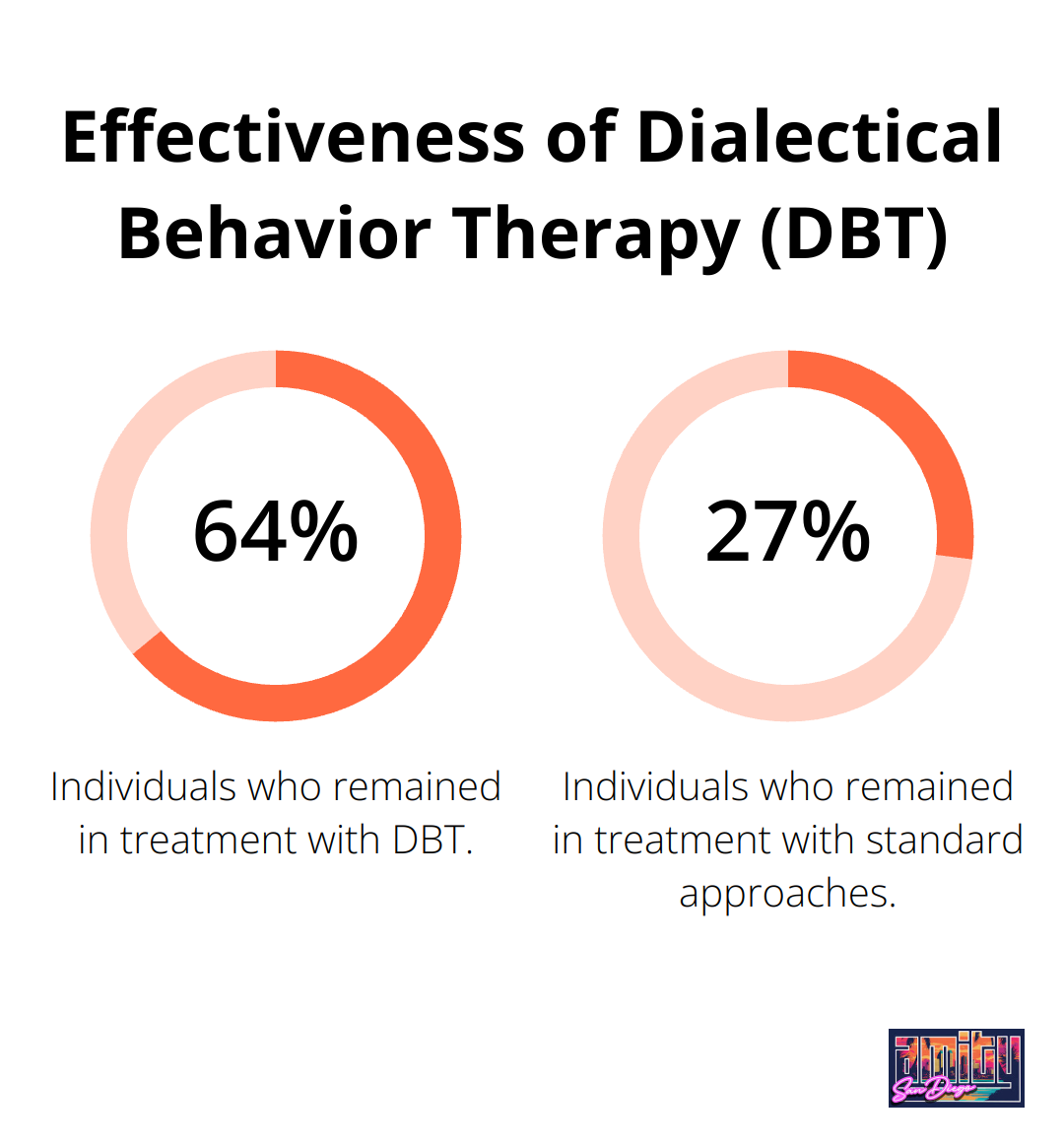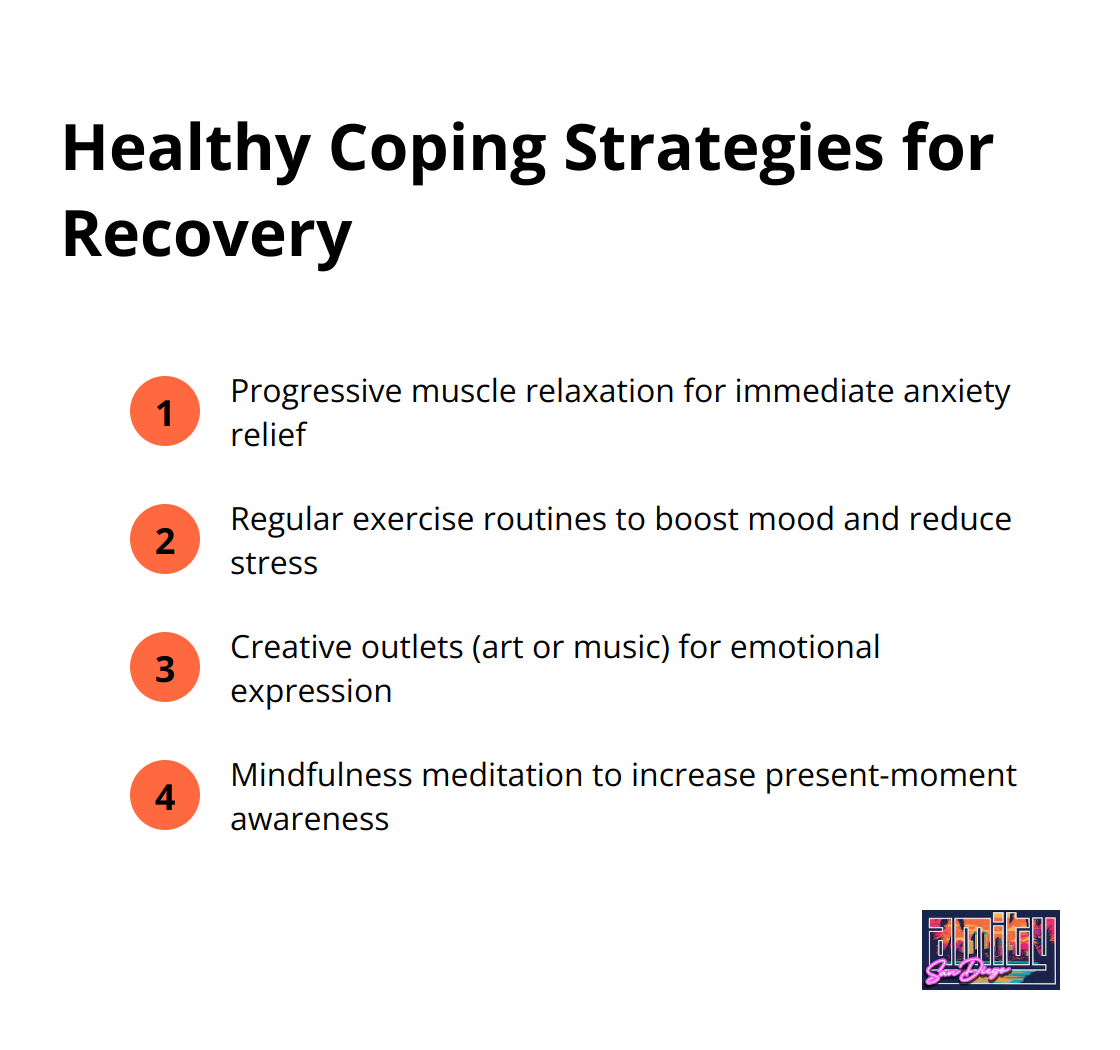At Amity San Diego, we understand that addiction recovery is a complex journey. Behavioral health plays a crucial role in this process, shaping how individuals respond to challenges and manage their recovery.
Understanding the intricate relationship between behavioral patterns and addiction is key to developing effective treatment strategies. In this post, we’ll explore how behavioral health interventions can transform the recovery process and provide practical tools for lasting change.
How Behavioral Health Shapes Addiction
Behavioral health forms the cornerstone of addiction recovery. It encompasses our actions, thoughts, and emotions that influence our overall well-being, including mental health, substance use patterns, and daily functioning.
The Roots of Addictive Behaviors
Addiction often originates from deeply ingrained behavioral patterns. These patterns develop as coping mechanisms for stress, trauma, or mental health issues. Similarly, people with mental disorders are at a higher risk of developing substance use problems.
Many individuals initially turn to substances to self-medicate underlying emotional pain or manage difficult life situations. Over time, this behavior becomes habitual, rewires the brain’s reward system, and makes it increasingly challenging to break the cycle without professional help.

The Feedback Loop of Addiction and Mental Health
Addiction and mental health issues often create a complex, intertwined relationship. For example, someone struggling with depression might consume alcohol to numb their feelings. However, alcohol’s depressant effects can worsen their symptoms, leading to increased consumption (a vicious cycle that’s difficult to break without targeted intervention).
This cyclical nature underscores the importance of addressing both substance use and mental health concurrently. The Substance Abuse and Mental Health Services Administration (SAMHSA) emphasizes that integrated treatment for co-occurring disorders leads to better outcomes than treating each condition separately.
Breaking the Cycle Through Behavioral Change
Effective addiction recovery requires a fundamental shift in behavioral patterns. This shift involves identifying triggers, developing healthier coping strategies, and rewiring the brain’s reward system. Cognitive Behavioral Therapy (CBT) serves as a powerful tool in this process, helping individuals recognize and modify harmful thought patterns and behaviors.
CBT can be effective in reducing the likelihood of relapse among drug users. This highlights the critical role of behavioral interventions in sustaining long-term sobriety.
The Power of Personalized Interventions
Every individual’s journey to recovery is unique. Personalized behavioral health strategies (tailored to each person’s specific needs and circumstances) prove most effective in supporting long-term recovery. These strategies might include a combination of:
- Individual therapy sessions
- Group support meetings
- Mindfulness and stress-reduction techniques
- Lifestyle modifications (e.g., exercise, nutrition, sleep hygiene)
The next chapter will explore specific behavioral health strategies that play a key role in addiction treatment San Diego, including Cognitive Behavioral Therapy techniques, Dialectical Behavior Therapy approaches, and mindfulness practices.
Effective Behavioral Health Strategies for Recovery
At Amity San Diego, we employ a range of evidence-based behavioral health strategies to support individuals in their recovery journey. These approaches address the complex interplay between addiction and mental health, providing practical tools for lasting change.
Cognitive Behavioral Therapy: Rewiring Thought Patterns
Cognitive Behavioral Therapy (CBT) forms a cornerstone of effective treatment approaches. This technique helps individuals identify and challenge negative thought patterns that contribute to addictive behaviors. CBT has demonstrated efficacy as both a monotherapy and as part of combination treatment strategies for substance use disorders.
CBT sessions typically involve:
- Identification of triggers and high-risk situations
- Development of coping strategies to manage cravings
- Challenging and reframing of negative self-talk
- Building of problem-solving skills for daily life challenges
Dialectical Behavior Therapy: Balancing Acceptance and Change
Dialectical Behavior Therapy (DBT) proves particularly effective for individuals who struggle with emotional regulation and impulsivity. This approach combines mindfulness techniques with practical skills for managing intense emotions.
Key components of a DBT program include:
- Mindfulness training to increase awareness of thoughts and emotions
- Distress tolerance skills to cope with challenging situations
- Interpersonal effectiveness training to improve relationships
- Emotion regulation techniques to manage mood swings
Research has shown that individuals who received DBT were significantly more likely to remain in treatment (64% versus 27%) and achieved greater reductions in drug abuse compared to standard treatment.

Mindfulness and Stress Reduction: Cultivating Present-Moment Awareness
Mindfulness practices play a vital role in a holistic approach to addiction recovery. These techniques help individuals develop a non-judgmental awareness of their thoughts, feelings, and bodily sensations, reducing the automatic pilot mode that often leads to substance use.
A comprehensive mindfulness program often includes:
- Guided meditation sessions
- Body scan exercises for increased body awareness
- Mindful breathing techniques for stress reduction
- Yoga classes to promote mind-body connection
Studies indicate that mindfulness-based interventions reduce substance misuse and craving by modulating cognitive, affective, and psychophysiological processes integral to self-regulation and addictive behavior.
The integration of these evidence-based behavioral health strategies provides a comprehensive toolkit for individuals to navigate the challenges of recovery. A tailored approach (based on each person’s unique needs) ensures the best possible outcomes in their journey towards lasting sobriety and improved mental health.
The next chapter will explore how individuals can implement these behavioral health changes in their daily lives, focusing on identifying triggers, developing healthy coping mechanisms, and building a supportive environment.
How to Implement Behavioral Changes in Recovery
At Amity San Diego, we see how implementing lasting behavioral changes transforms addiction recovery. This process demands dedication, self-awareness, and practical strategies. Let’s explore effective ways to make these changes a permanent part of your recovery journey.
Identify and Respond to Triggers
The first step to modify your responses is to recognize your personal triggers. We recommend you keep a journal to track situations, emotions, or thoughts that lead to cravings. After you pinpoint these triggers, work with your therapist to develop specific action plans for each one.
For example, if work stress triggers you, create a plan that includes a 5-minute mindfulness break, a call to a support person, or the use of a stress-relief app. Behavioral therapies help people in drug addiction treatment modify their attitudes and behaviors related to drug use.
Build a Toolbox of Healthy Coping Mechanisms
To support long-term recovery, you need to develop a diverse set of healthy coping strategies. This toolbox should include both immediate relief techniques and long-term stress management practices. Some effective strategies our clients find helpful include:

Strengthen Your Recovery Support Network
A strong support system is essential to maintain behavioral changes. This network should include professionals, peers in recovery, and supportive friends and family. We encourage our clients to:
- Attend regular support group meetings
- Maintain consistent contact with a sponsor or mentor
- Participate in family therapy sessions to improve home dynamics
- Engage in community activities that support a sober lifestyle
Research suggests that on an individual-level, a person’s perception and source of social support is particularly important.
Practice Consistency and Patience
Implementing behavioral changes is a process that requires patience and persistence. You will face challenges along the way (this is normal and expected). The key is to stay committed to your recovery goals and utilize the resources and support available to you. With consistent effort and the right strategies, you can create lasting positive changes that support your journey to a healthier, addiction-free life.
Embrace Technology as a Support Tool
Modern technology offers valuable tools to support your recovery journey. Many of our clients find success with:
- Recovery tracking apps (to monitor progress and identify patterns)
- Meditation and mindfulness apps (for stress reduction)
- Online support communities (for 24/7 peer connection)
- Telemedicine platforms (for convenient check-ins with healthcare providers)
Recent studies aim to understand whether addiction counselors are recommending that their patients use addictions-focused apps to help them in their recovery.
Final Thoughts
Behavioral health shapes the path to lasting sobriety and improved mental well-being in addiction recovery. We at Amity San Diego use personalized treatment strategies that combine evidence-based therapies, support systems, and lifestyle modifications. Our approach addresses both substance use and co-occurring mental health issues, providing a solid foundation for long-term recovery.
Professional help and support make a significant difference in overcoming addiction. We offer comprehensive, evidence-based addiction treatment San Diego in a supportive environment. Our team of experienced professionals dedicates itself to providing personalized care that transforms lives and supports individuals in reclaiming their future.
The first step towards recovery opens the door to a transformative journey. With the right support, tools, and commitment to change, you can achieve lasting recovery. Embrace the power of behavioral health in your recovery journey and create a brighter, healthier future for yourself.



